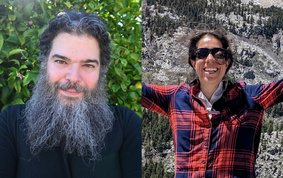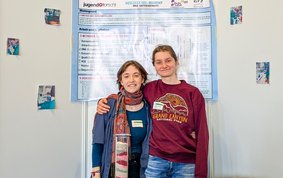From the Earth’s surface to the deep biosphere
The section Geomicrobiology investigates geomicrobiological processes both on the Earth’s surface including the critical zone and in the ’deep biosphere‘, which supposedly plays a fundamental role within the global biogeochemical cycles over short and long time scales. Our research focuses on the development and distribution of microbial life in terrestrial environments particularly in extreme habitats such as permafrost, deserts, lake sediments and the deep subsurface in continental areas. We analyse the dynamics and processes of microbial communities and the related complex geologic-biological interactions.
We established the novel Helmholtz Laboratory for Integrated Geological and Biological Research (GeoBioLab) as an interdisciplinary platform for joint activities of scientists from various disciplines including microbiology/molecular biology, (bio)geochemistry, bioinformatics, and geomorphology to address our scientific questions in a wide range of environments and disciplines. In addition to basic research, we also work on translating suitable results into applications. These include, for example, the development of equipment for sediment sampling and sample preparation or the utilization of the genetic resources represented by our unique type culture collection of extremophilic microorganisms for industrial or biotechnological applications.
Members of section Geomicrobiology are also actively involved in the transfer of scientific discoveries, achievements, and know-how to entrepreneurial and business applications. Recently, the GreenGate Genomics GmbH was started and spun out as part of the Helmholtz Enterprise project funding program. This currently developing Start-up offers bioinformatic services, software, and support in the areas of environmental and molecular microbiology. Please visit https://greengategenomics.com for more information.
- Ann Mary Abraham (Guest)
- Dr. Claudia Bruhn (Guest)
- Robert Fritzenkötter (Guest)
- M. Sc. Shivani Nundoo
- Anke Saborowski
- Dr. Manuel Schad (Guest)
- Olivia Schaffer (Guest)
- M. Sc. Johanna Schwarzer (Guest)
- Dr. Jana Täumer
- Dr. Tatjana Zivkovic
Projects of the working group:
- CH₄Remove - Enhancing negative methane emissions through microbial engineering
- MiDiPeat - Monitoring of peat microbial diversity through vegetation properties and its implication for carbon dynamics across European peatlands
- MOMENT - Permafrost Research Towards Integrated Observation and Modelling of the Methane Budget of Ecosystems
- RELATE - Rhizosphere mediation of biosphere-climate feedbacks
- WETSCAPES2.0 - Sinks, links and legacies of novel ecosystems in rewetted fen landscapes / Projekt A5: Development and resilience of microbial CH4 oxidizers in rewetted fens
- M. Sc. Simone Bernsee
- M. Sc. Zeyu Jia
- Qiao Liu (Guest)
- M. Sc. Fatima Ruiz Blas (Guest)
- Dr. Aurele Vuillemin
- Lin Zang (Guest)
Projects of the working group:
- ERC Synergy Project “Archean Park - Relics of Ancient Cellular Biochemistry in High-CO2 Subsurface Ecosystems”
- MGF Ostsee II - Effects of mobile bottom-contact fishing
- BioMetArchive – Subsurface biosphere metagenomics
- Bushveld ICDP

















![[Translate to English:] René Steinmann and Jana Täumer](/fileadmin/_processed_/d/e/csm_20240415_Discovery-Fellows_fe0e84fc5e.jpeg)
